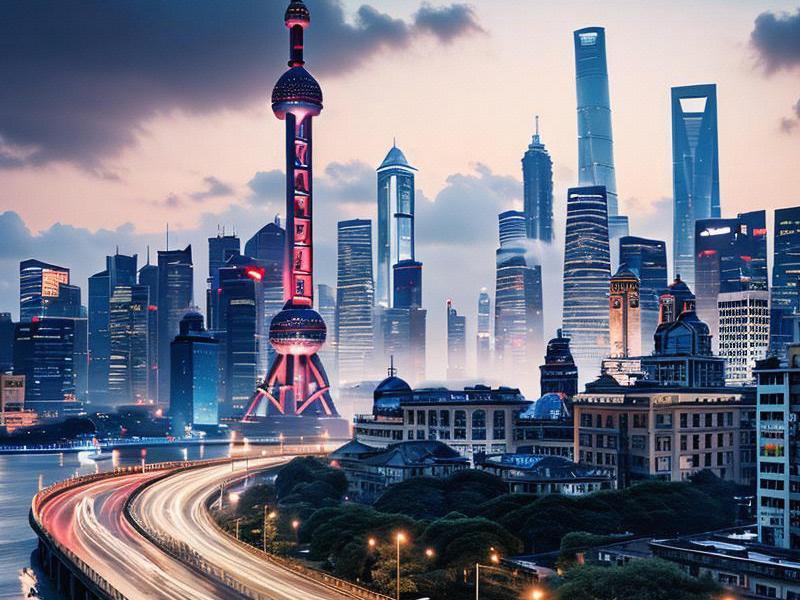
Shanghai, a city that has long been a symbol of China's modernization, stands today as a vibrant metropolis where the old and the new coexist in harmony. This city, with its skyline punctuated by the iconic Oriental Pearl Tower and the sleek silhouette of the Shanghai Tower, is not just a testament to China's economic prowess but also a living museum of urban culture.
The history of Shanghai is deeply intertwined with its position as a port city. Since the 19th century, Shanghai has been a gateway for international trade and cultural exchange. The Bund, with its colonial-era architecture, stands as a reminder of the city's cosmopolitan past. Here, the stately buildings that once housed foreign consulates and banks now stand alongside modern skyscrapers, creating a unique juxtaposition of history and modernity.
The urban culture of Shanghai is a melting pot of diverse influences. The city's location at the mouth of the Yangtze River has made it a natural hub for trade and cultural exchange. Over the centuries, Shanghai has absorbed elements from various cultures, including those of Western nations, which have left an indelible mark on the city's architecture, cuisine, and lifestyle.
One of the most striking aspects of Shanghai's urban culture is its architectural diversity. From the Art Deco buildings of the French Concession to the traditional Shikumen (stone gate) houses, each neighborhood tells a story of the city's rich history. The Yu Garden, a classical Chinese garden, offers a serene escape from the bustling streets, showcasing the traditional Chinese aesthetic of balance and harmony.
夜上海最新论坛 Cuisine is another facet of Shanghai's urban culture that reflects its cosmopolitan nature. Shanghai cuisine, known for its sweet and savory flavors, is a blend of local ingredients and cooking techniques influenced by other regions and foreign cuisines. Dishes like Xiaolongbao (soup dumplings) and Shengjianbao (pan-fried dumplings) are not just culinary delights but also symbols of the city's ability to integrate diverse flavors into its own unique style.
The lifestyle of Shanghai's residents is a testament to the city's dynamic culture. The pace of life in Shanghai is fast, reflecting the city's status as a global financial center. Yet, amidst the hustle and bustle, there is a strong emphasis on quality of life and cultural enrichment. The city boasts an array of cultural institutions, including museums, theaters, and art galleries, that cater to a diverse audience.
Shanghai's cultural scene is particularly vibrant in the realm of art and fashion. The city hosts numerous art exhibitions and fashion shows, attracting artists and designers from around the world. The Shanghai International Film Festival and the Shanghai Fashion Week are just two examples of the city's commitment to fostering creativity and innovation.
The city's approach to urban development also reflects its cultural values. Shanghai has made significant efforts to preserve its historical heritage while embracing modernity. The renovation of historic neighborhoods like the French Concession and the Nanshi and Xiahui districts has created areas where visitors can experience the best of both worlds.
上海私人品茶 In recent years, Shanghai has also been at the forefront of China's digital transformation. The city's smart city initiatives have integrated technology into urban life, enhancing convenience and sustainability. From mobile payment systems to intelligent transportation networks, Shanghai is demonstrating how technology can be used to improve the quality of life for its residents.
The cultural fusion in Shanghai is not without challenges. As the city continues to grow and modernize, there is a need to balance economic development with the preservation of its cultural identity. The influx of foreign influences, while enriching, also poses the risk of diluting the city's unique character.
To address these challenges, Shanghai has implemented policies aimed at promoting cultural diversity and inclusivity. The city encourages the participation of local communities in cultural activities and supports initiatives that celebrate traditional arts and crafts. By fostering a sense of pride in its cultural heritage, Shanghai ensures that its urban culture remains vibrant and resilient.
上海品茶网 The future of Shanghai's urban culture looks promising. As the city continues to evolve, it is likely to remain a global leader in cultural exchange and innovation. The integration of technology, the preservation of historical sites, and the promotion of cultural diversity will be key factors in shaping the city's identity in the years to come.
Shanghai's urban culture is a microcosm of China's broader cultural landscape. It reflects the country's ability to embrace change while honoring its traditions. The city's success story serves as an inspiration for other urban centers around the world, demonstrating the potential of cultural fusion to drive progress and crteeaa more inclusive society.
In conclusion, Shanghai stands as a beacon of modernity and cultural richness. Its urban culture is a testament to the city's history, resilience, and creativity. As Shanghai continues to grow and adapt, it will undoubtedly remain a vital part of the global cultural fabric, offering a unique perspective on the interplay between tradition and modernity.
The city's ability to blend the old with the new, to honor its past while embracing the future, is what makes Shanghai such a fascinating place. It is a city that not only reflects the aspirations of its people but also serves as a model for sustainable urban development and cultural preservation.
As we look to the future, Shanghai's urban culture will continue to evolve, shaped by the dynamic interplay of tradition and innovation. The city's journey is a reminder that the true essence of a metropolis lies not just in its skyscrapers and bustling streets but in the rich tapestry of its culture and the stories it tells.
